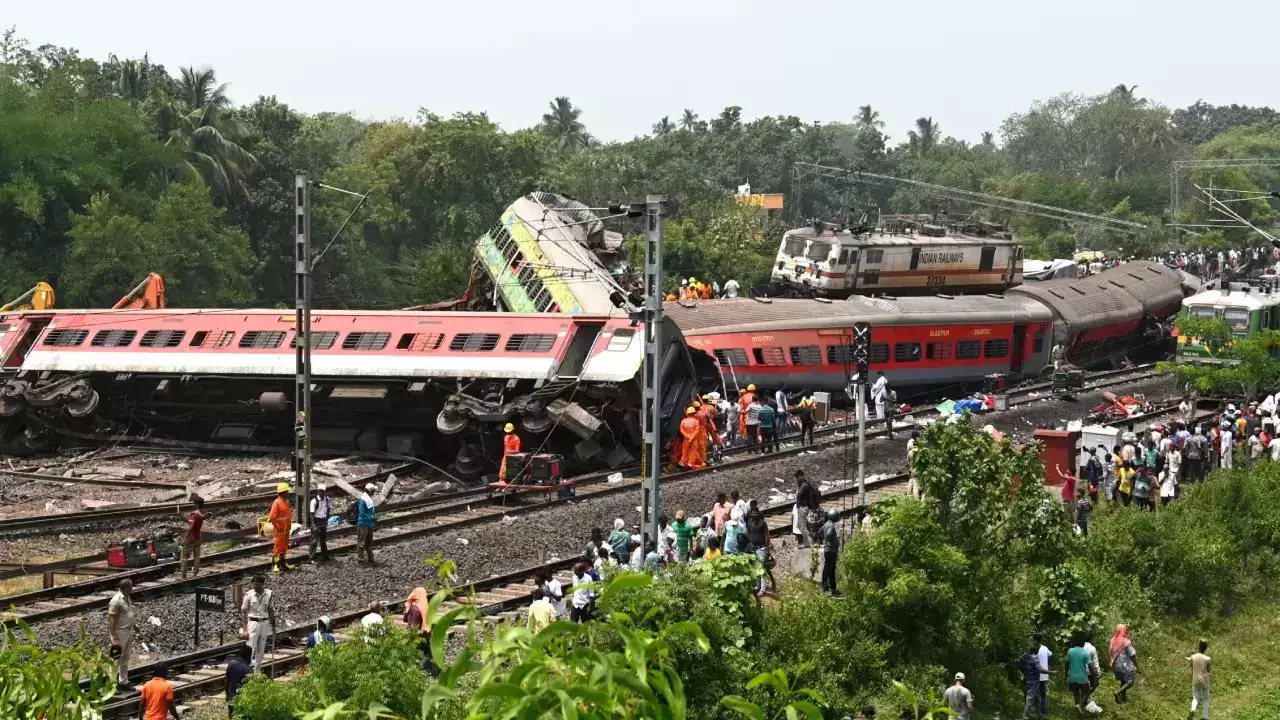Description

Copyright infringement not intended
Context: In its 2022 report on "Derailments in Indian Railways," the Comptroller and Auditor General of India (CAG) identified numerous shortcomings and made several recommendations, including ensuring strict adherence to the scheduled timelines for conducting and concluding accident investigations.
Details
- The Comptroller and Auditor General of India (CAG) 2022 report on ‘Derailments in Indian Railways’ highlighted several deficiencies and lapses in the safety management system of the national transporter.
- The report analysed the data on derailments from 2018 to 2021 and found that there was an increase in the number of derailments due to track defects, human errors and rolling stock failures.
- The report also pointed out that the Indian Railways did not have a comprehensive policy or standard operating procedure for dealing with derailments, which resulted in delays in the restoration of train services, loss of revenue and inconvenience to passengers.
Some of the major findings of the report are:
- Out of the total 1,024 derailments that occurred during 2018-21, 347 (33.89%) were due to track defects, 305 (29.79%) were due to human errors and 272 (26.56%) were due to rolling stock failures.
- The number of derailments due to track defects increased from 77 in 2018-19 to 103 in 2020-21, while the number of derailments due to human errors increased from 66 in 2018-19 to 92 in 2020-21.
- The report stated that there was no uniformity or consistency in the classification and reporting of derailments by the Indian Railways.
Lack of effective track maintenance and monitoring
- The report observed that there was a lack of effective track maintenance and monitoring, which led to the deterioration of track conditions and increased vulnerability to derailments.
- The report also noted that there was a shortage of trackmen, supervisors and engineers, which affected the quality and frequency of track inspections.
Mismatch between the demand and supply
- The report found that there was a mismatch between the demand and supply of rolling stock, especially coaches and wagons, which resulted in overloading and over-speeding of trains.
- The report also observed that there was inadequate maintenance and testing of rolling stock components, such as wheels, axles, bearings and brakes, which increased the risk of failures and derailments.
Lack of coordination and communication
- The report also pointed out that there was a lack of coordination and communication among various departments and agencies involved in the investigation and restoration of derailments, which led to delays and discrepancies in the analysis and reporting of the causes and consequences of derailments.

The report made several recommendations to improve the safety performance of the Indian Railways, such as:
Formulating a holistic policy
- Formulating a holistic policy for derailment prevention and mitigation, with clear roles and responsibilities of various departments and agencies. The policy should include guidelines for risk assessment, contingency planning, emergency response and recovery.
Improving the track maintenance and inspection system
- Improving the track maintenance and inspection system, with adequate manpower, equipment and technology.
- The report stressed the need for regular track renewal, especially on busy routes, and the use of modern devices such as track geometry cars and ultrasonic flaw detectors to monitor track conditions.
Enhancing the quality and reliability
- Enhancing the quality and reliability of rolling stock, with regular overhauling, testing and monitoring. The report highlighted the importance of ensuring proper design, manufacturing and maintenance of coaches, wagons and locomotives, as well as the installation of anti-climbing devices and couplers to reduce the impact of collisions.
Implementing human resources development initiatives
- Implementing human resources development initiatives, such as training, counselling and motivation of staff involved in safety-related activities. The report emphasized the need for improving the skills and competence of drivers, guards, station masters and other personnel, as well as addressing their fatigue and stress levels.
Accelerating the implementation of modern signalling
- Accelerating the implementation of modern signalling and train protection systems, such as automatic train protection (ATP) and train collision avoidance system (TCAS). The report noted that these systems can significantly reduce human errors and enhance operational safety by providing automatic braking and speed control.
Coordination and communication
- Establishing a robust mechanism for coordination and communication among various stakeholders, such as railway administration, security agencies, state governments and local authorities. The report suggested that this mechanism should facilitate the timely exchange of information, joint planning and execution of safety measures, and effective management of crises.
Conducting periodic safety audits
- Conducting periodic safety audits and reviews, with independent external experts and feedback from passengers and the public. The report recommended that these audits and reviews should evaluate the performance of safety systems, identify gaps and weaknesses, and suggest corrective actions.

Conclusion
- The railway sector in India faces a serious challenge of ensuring safety and efficiency in its operations, as highlighted by the recent report of the Comptroller and Auditor General (CAG) on ‘Derailments in Indian Railways’. The report reveals the various causes and consequences of train accidents and suggests measures to prevent them. The report also emphasizes the importance of accountability and transparency in the railway sector, which are essential for its long-term viability and development
Must Read Articles:
Comptroller and Auditor General of India (CAG): https://www.iasgyan.in/daily-current-affairs/comptroller-and-auditor-general-cag-3
|
PRACTICE QUESTION
Q. What are some of the urgent steps that the national transporter should take to ensure safe and efficient rail operations, according to the CAG’s report on ‘Derailments in Indian Railways’? How can the railway sector improve its accountability and transparency, which are vital for its long-term sustainability and growth?
|
https://www.thehindu.com/news/national/cags-2022-report-on-derailments-in-indian-railways-flagged-multiple-shortcomings/article66928704.ece











